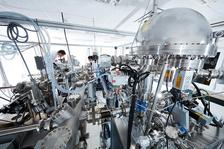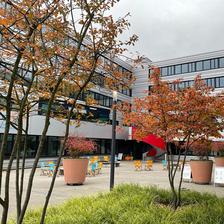The ultra-high vacuum (UHV) laboratory in the DESY NanoLab (now located in the CXNS building 94). (Photo: DESY)
The DESY Nanolaboratory (DESY NanoLab) is a facility providing access to advanced nano-characterization, nano-structuring and nano-synthesis techniques which are complementary to the advanced X-ray techniques available at DESY’s lightsources. The DESY NanoLab consists of several strong pillars in nanoscience research: microscopy, nano-structuring, spectroscopy, nanoparticle synthesis, in-situ and operando X-ray diffraction, electrochemistry, and magnetism. A laser lab is planned for the preparation of ultrafast pump-probe experiments in cooperation with Leibniz-Institut für Kristallzüchtung (IKZ) to complement the NanoLab science fields. The methods available are complementary to the photon-based techniques at the DESY X-ray facilities PETRA III and FLASH and the European XFEL. Access to the DESY NanoLab for external users is granted via regular PETRA III or FLASH proposals and European access programmes, such as NFFA Europe. Industrial users can access via DESY Innovation and Technology Transfer (ITT).
The DESY NanoLab is being developed and operated by the DESY Research Group X-ray physics and nanoscience. After years of planning and building the NanoLab and its offices have been relocated to the new Center for X-ray and Nano Science (CXNS) close to the PETRA III Max-von-Laue Hall, allowing easy and fast access to the PETRA III beamlines. While most of the laboratories are situated in the CXNS, both X-ray and electrochemistry labs are in close vicinity. The creation of an X-ray lab with 3 independent hutches delivers more space for increased demand from internal and external users for structural X-ray characterisations. A second sixth-circle-diffractometer will be established in the X-ray laboratories as well. The extension of the DESY NanoLab includes the installation of a scanning Auger microscope in the PETRA III experimental hall ‘Max-von-Laue’ as well, which was fitted in November 2021. It provides surface-sensitive chemical analysis with less than 10 nm lateral resolution and complement the microscopy section of the NanoLab.
The NanoLab ultrahigh vacuum scanning probe microscope has received a helium cooling upgrade which allows sample temperatures of around 20 K to study a wider range of molecule adsorption on surfaces and nanostructures. The existing UHV transfer system has been extended by three additional modules to provide further space for additional analysis systems. This transfer system allows sample transfer under UHV conditions between different characterisation chambers as well as to different DESY X-ray facilities.
Access to DESY NanoLab instrumentation is possible via submission of a research proposal for a combined access to NanoLab and the DESY lightsources PETRA III or FLASH via DOOR during the calls for proposals. Transnational access to instrumentation of DESY NanoLab and, if required, to a limited amount of X-ray beamtime at PETRA III can also be requested via a research proposal that can be submitted via the European Union research project Nanosience Foundries and Fine Analysis (NFFA). Industrial users can access via DESY Innovation and Technology Transfer (ITT).
| DESY NanoLab Instrumentation |
There are two access options for DESY NanoLab:
- Short term access on the basis of 4 h shifts (for e.g., sample characterization by SEM, AFM, XPS etc.)
- Standard access (permitting access over a longer period needed for e.g., sample preparation and characterization)
Once the combined proposal for Desy NanoLab and one of DESY's lightsources is accepted, access to DESY NanoLab is scheduled prior, during or after the X-ray beamtime to ensure a successful and smooth experiment.
A member of DESY NanoLab will assist in the proposed experiment or teach the user accordingly, depending on the complexity of the applied instrumentation and the experience of the user.
Operation hours of DESY NanoLab are 8 am – 5 pm on working days.
It is advisable to contact a member of DESY NanoLab (NanoLab@DESY.de) in advance of submitting a proposal and to discuss the feasibility of an experiment.
| Contact |
|
Prof. Dr. Andreas Stierle |









